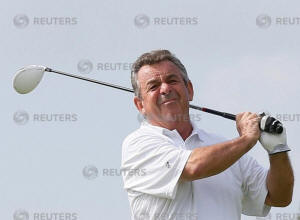|
Jacklin wants color-coded balls to limit distance
 Send a link to a friend
Send a link to a friend
 [November 02, 2018]
By Tony Jimenez [November 02, 2018]
By Tony Jimenez
LONDON (Reuters) - Ryder Cup great Tony
Jacklin has urged his sport to take a leaf out of squash's book by
using color-coded balls to distinguish the professional game from
the amateur one in the modern era of 'grip it and rip it golf'.
Jacklin is concerned at the way long hitters are dominating
professional golf, an issue that came to the fore again when Cameron
Champ, probably the longest driver seen on the PGA Tour, clinched
his first win at Sunday's Sanderson Farms Championship in
Mississippi.
Champ started to attract a lot of attention on the secondary Web.Com
Tour in 2017, averaging a single-season record of 343 yards off the
tee.
"Cameron is like a lot of guys on tour these days, they smash it a
mile," said Jacklin, the most successful European captain in Ryder
Cup history. "And most courses are set up to allow them to do it
because there is no premium on accuracy any more.
"It seems like everyone has bowed to new technology. The ball goes
miles which also means we need longer golf courses, making them more
expensive to maintain and having the negative impact of taking more
time to play 18 holes.

"Meanwhile, the amateur game seems much the same as it ever was. I
believe we could start to adapt by going the way of squash and using
different color-coded golf balls for the professionals and for the
amateurs," said Jacklin.
"Let's have one color for the ball that goes the furthest, then cut
the distance 20 or 30 percent and use a different color. You would
get round quicker while courses would be shorter and less expensive
to run."
Squash balls for senior players come in six varieties, each with
different levels of bounce denoted by colored dots. For younger
players, there are a number of mini-squash balls that have a high,
prolonged bounce.
Jacklin, who also won the 1969 British Open and 1970 U.S. Open,
believes modern-day golf has become too one-dimensional, with
imagination and creativity in short supply.
"It's become a bit ridiculous," he said. "The skill of the game,
shaping shots, keeping the ball in the fairway, they were attributes
that used to be very important.
"Nowadays you just need to be blessed with a big, strong body and a
putting stroke. Dustin Johnson, Brooks Koepka, Rory McIlroy, Jon
Rahm, they're all big hitters.
[to top of second column] |

Tony Jacklin of England tees off on the first hole during the first
round of the Mission Hills World Celebrity Pro-Am golf tournament in
Haikou, China's Hainan province October 20, 2012. REUTERS/Tyrone Siu/File
Photo

"The R&A and the USGA need to do something about the ball but they
are frightened the manufacturers will start gunning for them if they
make the decisions that need to be made," said Jacklin, who won two
matches as Ryder Cup captain in the 1980s and tied another one.
"All the advertising that comes from the manufacturers is based on
how far the ball can travel. The players play for millions of
dollars every week and maybe that makes the decision-making harder.
The governing bodies don't want to rock the boat."
The R&A, who govern golf along with the USGA, are in the middle of a
'Distance Insights' initiative where one of the aims is to discover
how players of all standards perceive the way distance, and its
impact, might evolve in the future.
"We are currently gathering data from a variety of sources as part
of the Distance Insights project and welcome submissions from
individuals and organizations who have a perspective on this issue,"
said an R&A spokesman.
Jacklin believes American Phil Mickelson's criticism of the narrow
fairways in Paris during Europe's Ryder Cup victory over the U.S. in
September is symptomatic of the modern-day thinking of
professionals.
"I was gobsmacked to hear Phil saying he'd never play another course
like Le Golf National again," said the 74-year-old Englishman. "From
my point of view, and the point of view of most experts, it was a
fantastic course.
"It's a sad reflection on the game the likes of Peter Thomson, Bobby
Locke, Ben Hogan and Jack Nicklaus used to play."
(Editing by Pritha Sarkar)
[© 2018 Thomson Reuters. All rights
reserved.] Copyright 2018 Reuters. All rights reserved. This material may not be published,
broadcast, rewritten or redistributed.
Thompson Reuters is solely responsible for this content.
 |